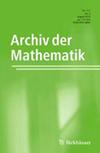$$\mathbb {P}^{2}$ 中点集合的模域
IF 0.5
4区 数学
Q3 MATHEMATICS
引用次数: 0
摘要
对于每一个 \(n\ge 6\), 我们举例说明,度数为 n 的 \(\mathbb {P}^{2}\) 的有限子集不会下降到模域上的任何 Brauer-Severi 曲面。反过来,对于每一个 \(n\le 5\), 我们证明度数为 n 的有限子集总是下降到模域上\(\mathbb {P}^{2}\) 的一个 0 循环。本文章由计算机程序翻译,如有差异,请以英文原文为准。
The field of moduli of sets of points in \(\mathbb {P}^{2}\)
For every \(n\ge 6\), we give an example of a finite subset of \(\mathbb {P}^{2}\) of degree n which does not descend to any Brauer–Severi surface over the field of moduli. Conversely, for every \(n\le 5\), we prove that a finite subset of degree n always descends to a 0-cycle on \(\mathbb {P}^{2}\) over the field of moduli.
求助全文
通过发布文献求助,成功后即可免费获取论文全文。
去求助
来源期刊

Archiv der Mathematik
数学-数学
CiteScore
1.10
自引率
0.00%
发文量
117
审稿时长
4-8 weeks
期刊介绍:
Archiv der Mathematik (AdM) publishes short high quality research papers in every area of mathematics which are not overly technical in nature and addressed to a broad readership.
 求助内容:
求助内容: 应助结果提醒方式:
应助结果提醒方式:


